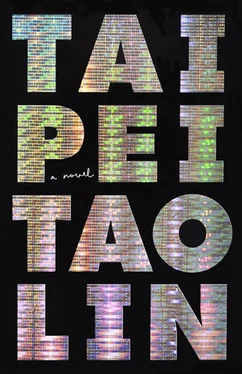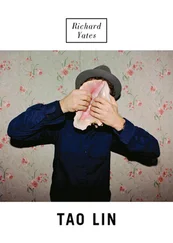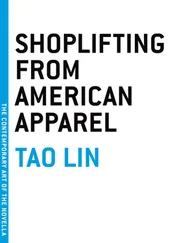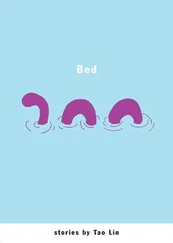“I was going to say that,” said Erin.
“I would get married to you.”
“Me too,” said Erin. “To you.”
“Let’s get married.”
“Let’s do it tomorrow.”
“Okay,” said Paul. “I’m confirmed.”
In Whole Foods, the next afternoon, Erin emailed her manager at the used bookstore that she was quitting her job, then scrolled through photos of Elvis standing between grinning, newlywed couples. Elvis appeared more energetic and alive than the couples in almost every photo, including one in which the couple was partially blocked from view by an over-eager Elvis who seemed to have lunged toward the camera, displaying the knuckles side of a peace sign.
“I don’t get it, at all,” said Paul.
“It’s what people do. This is what people want.”
“It really seems insane,” said Paul.
“People are insane,” said Erin.
“We should get an Elvis wedding.”
“I’m fine with an Elvis wedding.”
“Actually, I don’t want an Elvis wedding,” said Paul. “It seems extremely stressful.” Erin made a next-day reservation for a “desk wedding.” They discussed if they wanted to be on MDMA during their marriage ceremony. Erin said they should save it for the day after tomorrow, their last in Las Vegas.
“We might be dead by then,” said Paul.
“They won’t let us get married if we’re on drugs,” said Erin.
“They’ll think we’re on drugs if we’re not on drugs. We’re normal when we’re on drugs.”
Erin laughed weakly.
“We’ll just—” said Paul. “We’ll figure it out.”
“We’re going to be driving after the wedding, let’s just do it after we drive,” said Erin a few minutes later in a slightly pleading tone.
“Okay, okay,” said Paul earnestly while nodding and patting her shoulder, then hugged her briefly.
Across the street from the marriage license office was a billboard that said MAKING THE RIGHT CHOICE about used cars and used car parts. In the office, which was bright and quiet and arranged like a post office, while filling out forms, Paul said getting married was like getting a tattoo, in that he just wanted to pay money and receive a service, not make appointments and go places and talk to strangers and be asked to confirm his choice. Erin said she was thinking that also and had been “having the same feeling” as before she got tattoos. Paul noticed a sign that said intoxicated applicants would be TURNED AWAY and focused, as they approached the window, on appearing normal, but realized he didn’t know how.
“Look at the helpers,” he said pointing at six to ten clips, each clasping an impressive seeming amount of paper, magnetized to the side of a cabinet. “I want one.”
“Me too,” said Erin grinning. “Which one do you want?”
“Any of them,” said Paul after a few seconds.
“I want the curvy one,” said Erin.
Paul stared at the identical, brown clips.
“The guy with the stripes,” said Erin. “My own ‘underling.’ ”
“I’m talking about the plastic paper holder things,” said Paul.
• • •
Walking to their rental car they saw a shiny building and an abandoned building side by side, in the near distance. Paul expressed amazement at this second, also obvious, though maybe less egregious metaphor — the first being the used car billboard — and said their marriage would resemble the abandoned building in five years. After a pause, which functioned unintentionally for comic effect, he said “or, like, five days.”
Erin laughed. “Five months, maybe,” she said earnestly.
“Yeah,” said Paul thinking that of the fives — hours, days, weeks, months, years, decades — months was, by far, most likely. “We’ll be that tree,” he said pointing at a tree that appeared healthy and, he thought, dignified.
“The apartments for rent,” said Erin.
“The tree,” said Paul.
“Yeah, the tree.”
“The tree seems good.”
“Nature. Natural.”
“Jesus, look,” said Paul pointing at an eerie building far in the distance, thin and black, like a cursor on the screen of a computer that had become unresponsive. He imagined building-size letters suddenly appearing, left to right, in a rush— wpkjgijfhtetiukgcnlm —across the desert.
The marriage chapel was less than a mile away in a building containing four to six businesses. Paul sat on a two-seat sofa, in a sort of hallway, while Erin used the bathroom. Around ten people, mostly children, surrounding what appeared to be a newlywed couple, passed through Paul’s vision, on their way out of the building, then Erin sat by him, then the pastor (a large man with white hair and a serious but friendly demeanor) sat behind a tiny desk (six feet away, at the opposite wall) and read a prepared statement, completing the marriage, at which point — coincidentally, it seemed — a door opened and a smiling woman, with a tiny dog at her feet, congratulated Paul and Erin, after which, sort of huddled against each other, they moved toward the exit grinning.
“I immediately thought ‘fuck you’ to the stranger congratulating us,” said Paul outside, on a sidewalk. Erin laughed and said she thought “pop-up ad,” because “it went through the door,” and they hugged and jumped repeatedly as one mass, spinning a little and sometimes saying “we did it” quietly. Paul ran suddenly away, onto the parking lot, in a wide arc that curved eventually toward the rental car in a centripetal force, accelerating to a speed that was, at this point in his life, unfamiliarly fast, but not near maximum, before slowing, as he neared the passenger door — and, knowing he would not collide with the car, briefly aware of the dream-like amount of control he had over his body — to a stop.
In Erin’s car, two weeks later, on the way to Brooklyn — from Baltimore, where the past two nights he separately met Erin’s parents, who were married but lived apart — Paul texted two drug dealers, Android and Peanut, to buy MDMA, ecstasy, LSD, cocaine to have in Taiwan, where they were going in the morning. Paul’s parents had invited Paul and Erin to stay with them, as a kind of wedding present, all expenses paid including plane tickets, December 13 to January 2. The marriage, without which Paul likely would not be visiting Taiwan this year, seemed also to have drastically improved his relationship with his mother, who hadn’t mentioned drugs, at all, the past three weeks, now that she had something positive to focus on and nurture.
It was dark out and neither drug dealer had responded, after two hours, when they arrived in Brooklyn and parked by Khim’s. After buying lemons, celery, kale, apples, energy drinks, toilet paper they walked six blocks to Paul’s apartment, then within ten minutes both drug dealers — and Paul’s brother, to give Paul a Christmas present and presents to bring to their parents — texted that they were on their way. Android, named after the smartphone, Paul assumed, arrived first. Paul went outside, past the bronze gate, into Android’s expensive-seeming car.
“How’s it going? You all right?”
“Yeah, good. How are you?”
“I’m good,” said Android.
“Here’s $230,” said Paul, and Android transferred a vial of cocaine and a tiny baggie of capsules into Paul’s left hand. Paul asked if the MDMA was from the same batch as last time. Android said they were and, after a pause, in a voice subtly indicating auspiciousness due to rarity and increased quality, added that they were “double-dipped.” Paul visualized a stock image, composite from movies he’d seen, of ethnic workers apportioning powder into capsules. “Oh, good,” he said, and hesitated, then asked what “double-dipped” meant. Android, in response, seemed to shutdown, as a person, into a dormant state; when, after maybe two seconds, he returned to functioning, he seemed uncharacteristically bored and inattentive, like he wanted to be alone. “They do it twice. . it goes through once, and they dip it again,” he said unenthusiastically, with unfocused eyes and a subtle movement of his upper body that somehow effectively conveyed an additional, unrequired action within the process of an assembly line.
Читать дальше












